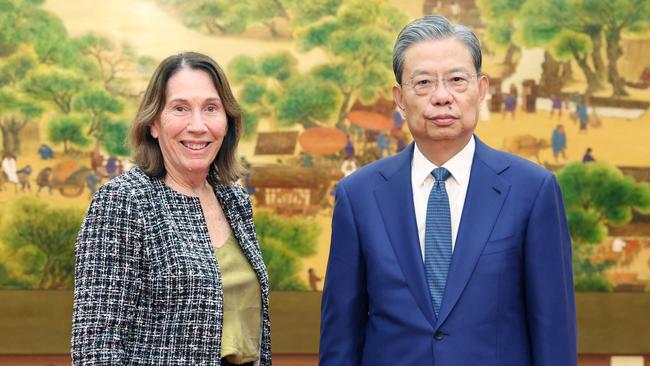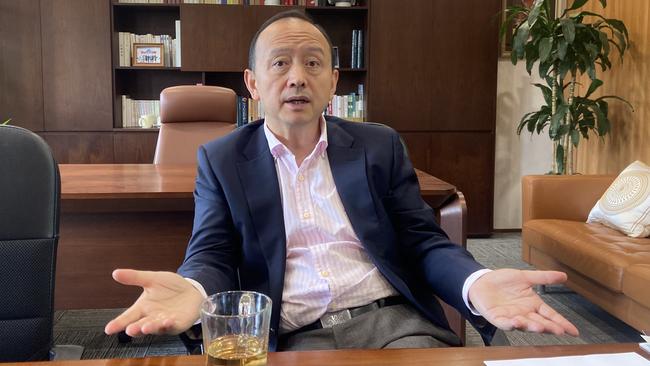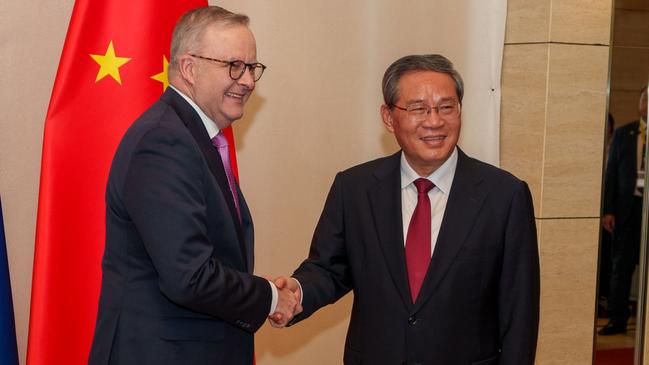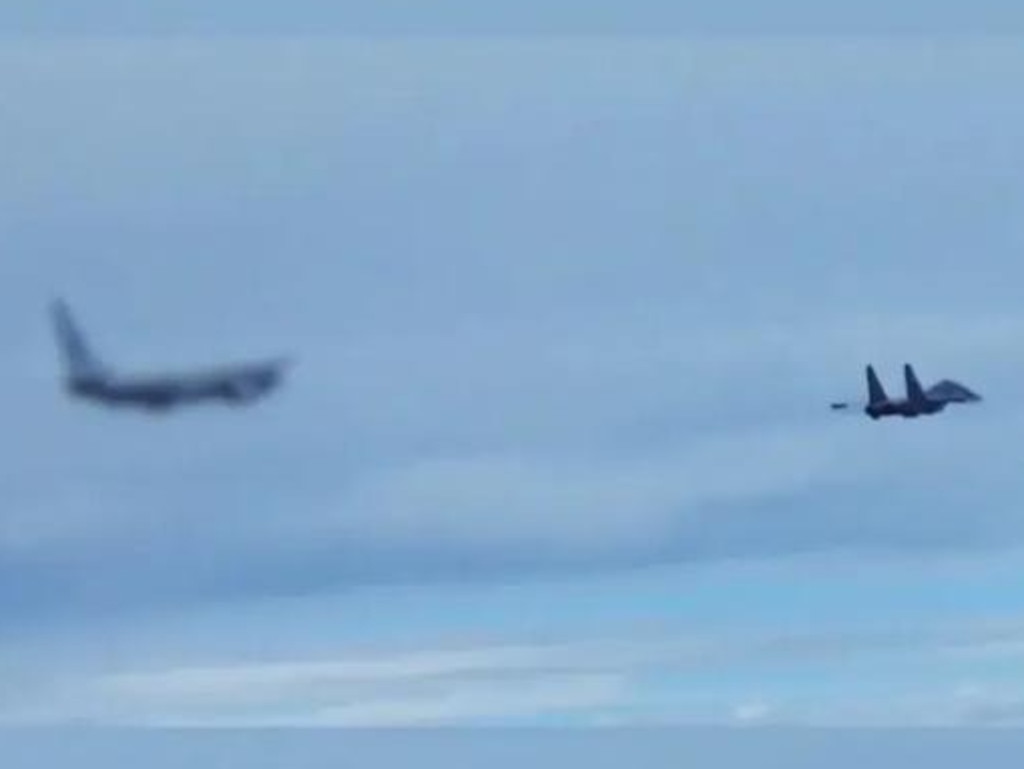Insider’s view of how AUKUS looks from China
Canberra is an increasing concern for military planners in Beijing who warn, ‘now we can easily reach Australia’.

Chinese officials haven’t started publicly calling Australia “two-faced” as they have the Biden administration – but have no doubt, that’s what they are thinking.
Comrade Zhao Leji, chairman of the National People’s Congress Standing Committee, barely disguised it as he met with grinning Senate President Sue Lines on Monday in the Great Hall of the People.
Zhao, the third-ranking member of Xi Jinping’s politburo, told the visiting Labor senator, who is leading a bipartisan federal parliamentary delegation to China, that relations with Australia had improved since the Albanese government was elected.
But he cautioned that Australia needed to maintain the “right perception” and respect “China’s core interests and major concerns”.
This advice was issued as the People’s Liberation Army was encircling Taiwan to, in the words of the PLA, practice “combat readiness patrols, blockade key ports and areas, [and] assault maritime and ground targets” in an attempt to intimidate Taiwan’s democratically-elected government.
Back in Canberra, a spokeswoman for Foreign Minister Penny Wong on Tuesday said China’s “large-scale military exercises around Taiwan” were “deeply concerning”.
“Differences should be resolved through dialogue, not the threat or use of force or coercion. We urge China to refrain from actions that increase the risk of accident and potential escalation. Peace and stability across the Taiwan Strait is in all our interests,” the Foreign Minister’s spokeswoman told The Australian in a statement.
Despite the happy snaps being posted by the travelling federal parliamentarians and last week’s announcement of the end of the black-listing of Australia’s $750m live lobster trade, deep structural tension remains coiled in our relationship with China.
It hasn’t been forgotten among China’s leadership that only a fortnight earlier an Australian navy ship sailed through the Taiwan Strait with vessels from New Zealand and Japan, China’s historic nemesis, on their way to patrols with China’s superpower rival, the US, in waters near The Philippines in the South China Sea.

Nor has it been lost that the Labor Prime Minister has made bipartisan Scott Morrison’s “AUKUS wager” – the Canberra-initiated effort to boost collective deterrence and, so goes the logic, reduce the chances of China using military force to further redraw the regional map.
That China was the target of AUKUS was not said explicitly – but it hasn’t been missed by Chinese defence planning. Zhou Bo, a retired senior colonel in the People’s Liberation Army Air Force, says: “It’s very simple: the Quad is because of China, while AUKUS is against China.”
In a wide-ranging interview in Beijing, he says Canberra’s posture is increasingly becoming a concern for China. “There is an inclination that is becoming more and more obvious,” says Zhou in the offices of Tsinghua University’s Centre for International Security and Strategy, where he is now a senior fellow.
“So when we make decisions, we have to take that into account.”
To China’s chagrin, Canberra continues to express its concern about Beijing’s behaviour towards Taiwan and the South and East China seas.
“Australia has a vision of a peaceful, stable and prosperous world where sovereignty is respected and countries abide by international law,” Prime Minister Anthony Albanese told the Chinese Premier when they met last Thursday.
The Chinese government in response casts Australia as a troublemaker acting on behalf of its ally the US – and not showing appropriate respect to what is by far its biggest customer.

In part because of the lack of access for Australian journalists in China since mid-2020, too much coverage of the Chinese perspective on AUKUS and how Beijing views Canberra’s defence plans has been dominated by Global Times editorials.
While Beijing will not allow interviews with its President, Premier or ministers, The Australian’s recent return to Beijing means the masthead can at least interview people involved in Chinese military policymaking to better understand China’s position.
On security affairs, Zhou, who retired from the PLA in 2020 to take up his role at Mr Xi’s alma mater, Tsinghua University, is one of the best informed security analysts in China. As well as think-tank work, he is often in Chinese delegations at 1.5-track security focused dialogues, including one with American officials hosted by Singapore’s Defence Ministry earlier in the year.
Zhou also has in-country experience in Australia thanks to a three-month visiting fellowship in 1999 at Duntroon, the Australian Army’s officer training college in Canberra. He still has a giant koala toy that was given to him by his Duntroon director. “At the instruction of my daughter, who was only seven, I had to carry it home,” he says.
Zhou had previously visited Australia in 1990, the first time he had left China. He was part of a PLA delegation doing flight training in Melbourne, a city whose material abundance made him feel like “a country boy”.
At that time there were only “two types of ties” in Guangzhou, the city in China’s south where he was serving in the PLA Air Force. That made the range at Melbourne’s department stores almost unfathomable.
“I would always go to David Jones to look at the ties because they were so beautiful. They were all so colourful,” he recalls.
‘Would not give a damn how Australia thinks’
China, now the world’s second biggest economy, no longer has a shortage of ties.
It also has an increasing abundance of military hardware as it continues what Defence Minister Richard Marles has called “the biggest conventional military build-up in the world since the Second World War”.
Beijing is urgently trying to improve the sophistication and quantity of its weapons – a point recently illustrated by the PLA blasting a ballistic missile over the Pacific for the first time in 44 years hours before Jim Chalmers arrived in Beijing. Australian officials and their allies can only guess at the timing, but Chinese interlocutors assure it had nothing to do with the Treasurer.
“China would not give a damn about how Australia thinks about this because we are definitely not launching this because of Australia,” Zhou says.
The missile launch came weeks after another PLA demonstration that disturbed Canberra. An Australian air force surveillance plane was featured in a highly produced documentary that ran on China’s national broadcaster CCTV. The plane – dubbed “the enemy” in the documentary, although not identified there as Australian – was harassed by a Chinese fighter jet as another PLA fighter took video of the encounter.
The disturbing incident took place in 2022 but vision of it had not previously been made public. Released less than a fortnight before the Australian Treasurer’s visit to Beijing, it begged the question: perhaps China also has “two faces”?
Zhou says the language was clumsy. “It was certainly wrong to describe Australia as an enemy,” he says. “If we haven’t described the US as an enemy, why should we describe Australia as an enemy?
“So this certainly doesn’t even look like an official statement.”
It is a subject on which Australian officials may seek further clarity during talks with Chinese counterparts at defence and maritime dialogues, which are likely to be held in China in the coming months.
For all the howls of anger in Beijing’s state-controlled media and umbrage by Chinese Foreign Ministry spokesmen and women, China’s leaders don’t bring up AUKUS directly in their meetings with their Australian counterparts.
Sources familiar with Albanese’s meetings with Xi in Bali in 2022 and Beijing in 2023 have told The Australian that AUKUS was not raised directly on either occasion. The Chinese Premier has also not brought it up directly in any of their five meetings.
That should not be mistaken for disinterest. While China’s leaders prefer to delegate the work of opposing AUKUS to others in the Chinese system, the defence technology agreement has replaced the Quad as the minilateral grouping that most concerns Beijing. “If you look at the Quad, it actually doesn’t have a lot of things that are military in nature, apart from the Malabar exercise and maritime domain awareness,” Zhou explains.
“But AUKUS right from the beginning is against China because this kind of capability will only be applied when it comes to potential conflicts with China.”
The potential growth of AUKUS troubles Beijing.
New Zealand, Canada and South Korea have all expressed an interest in joining the pact’s second pillar, which includes all non-submarine technology.
While Australia’s pursuit of nuclear-powered submarines has undoubtedly got Beijing’s attention, Chinese military planners downplay their significance – even if they come to fruition faster than currently planned.
“Even if you get all eight of them by 2035, how strong would the Chinese navy become by then?” asks Zhou.
Although as was illustrated by The Wall Street Journal’s recent revelation that a new-generation nuclear-powered PLA Navy submarine sunk during testing earlier in the year, China’s burgeoning military build-up is not without its own problems.
Despite Canberra’s role as the progenitor of AUKUS, Beijing speaks of it primarily as a tool of Washington. It is framed as part of the superpower struggle that defines the age.
“There is no doubt whatsoever about America’s intention to contain China militarily. The only thing is, I believe they are not even sure themselves whether they can achieve it or not,” says Zhou.
‘Now we can easily reach Australia’
Despite the China-monomania in Australia’s defence policy, there is still doubt in Beijing about what that might mean should conflict ever break out.
Former prime minister Paul Keating and his erstwhile foreign minister Gareth Evans say the AUKUS pact has locked Australia into any US-led defence of a Chinese invasion of Taiwan, but many in Beijing have their doubts.
“Would Australia fight for the US or not? I know there is a kind of a reservation so far in the expression of its attitude by the current (Australian) government,” says Zhou.
He is even more dismissive of the chances of the establishment of an “Asian NATO”, an idea championed by Japan’s new Prime Minister, Shigeru Ishiba. “I don’t buy that,” Zhou says.
He argues that beyond Japan, Australia and The Philippines, no one else in the region would join any American-led effort.
“So we won’t have more than a handful of countries and even these countries, I doubt that they are, you know, fully supportive of the US,” he says.
Zhou is insistent that there is no determined plan for conflict over Taiwan or any of the other hotspots in the South China Sea. “We’re not talking about an inevitable war,” he says. “I don’t believe it is inevitable. I believe that peace is still possible – at least, the Chinese government has not given up hope.”
Xi made this point directly to European officials, according to a much-discussed report in the Financial Times, telling them the US was “trying to trick China into invading Taiwan”.
In Zhou’s analysis, Canberra has not yet joined Tokyo at the top of Beijing’s regional blacklist, but the direction of travel is a concern.
“Australia is between Japan and Thailand and moving closer to Japan,” he says.
He offers Singapore as a model for Australia, citing his experience earlier in the year in the Chinese delegation at the three-way dialogue with the US organised by Singapore’s Ministry of Defence.
The Singaporeans used it as an attempt to get the two superpowers to discuss fraught security issues, all while amplifying Singapore’s concerns.
“My conclusion is: the US has full trust in Singapore,” he says.
“And the Chinese have some trust in Singapore, not fully.
“But there is no doubt that Singapore really, really wants to put these two countries together because it’s good for (Singapore’s) survival.”
Zhou suggests Australia could position itself similarly as a country trying to facilitate conversation between the two giants.
“And in this regard, your position probably is even more important than Singapore,” he says.
However, he concedes there are perhaps some unrealistic hopes in Beijing about the role Australia might play in the coming years. “I think the Chinese maybe still have some wishful thinking,” he says. “Why would Australia suddenly join the US in attacking China? This would be a little bit puzzling from the Chinese attitude.”
Zhou cautions against wishful thinking in Canberra as it enmeshes itself further and further in the superpower showdown.
“Why would China threaten Australia?” he asks. “There’s no reason. But in terms of China’s military capabilities, now we can easily reach Australia.”








To join the conversation, please log in. Don't have an account? Register
Join the conversation, you are commenting as Logout